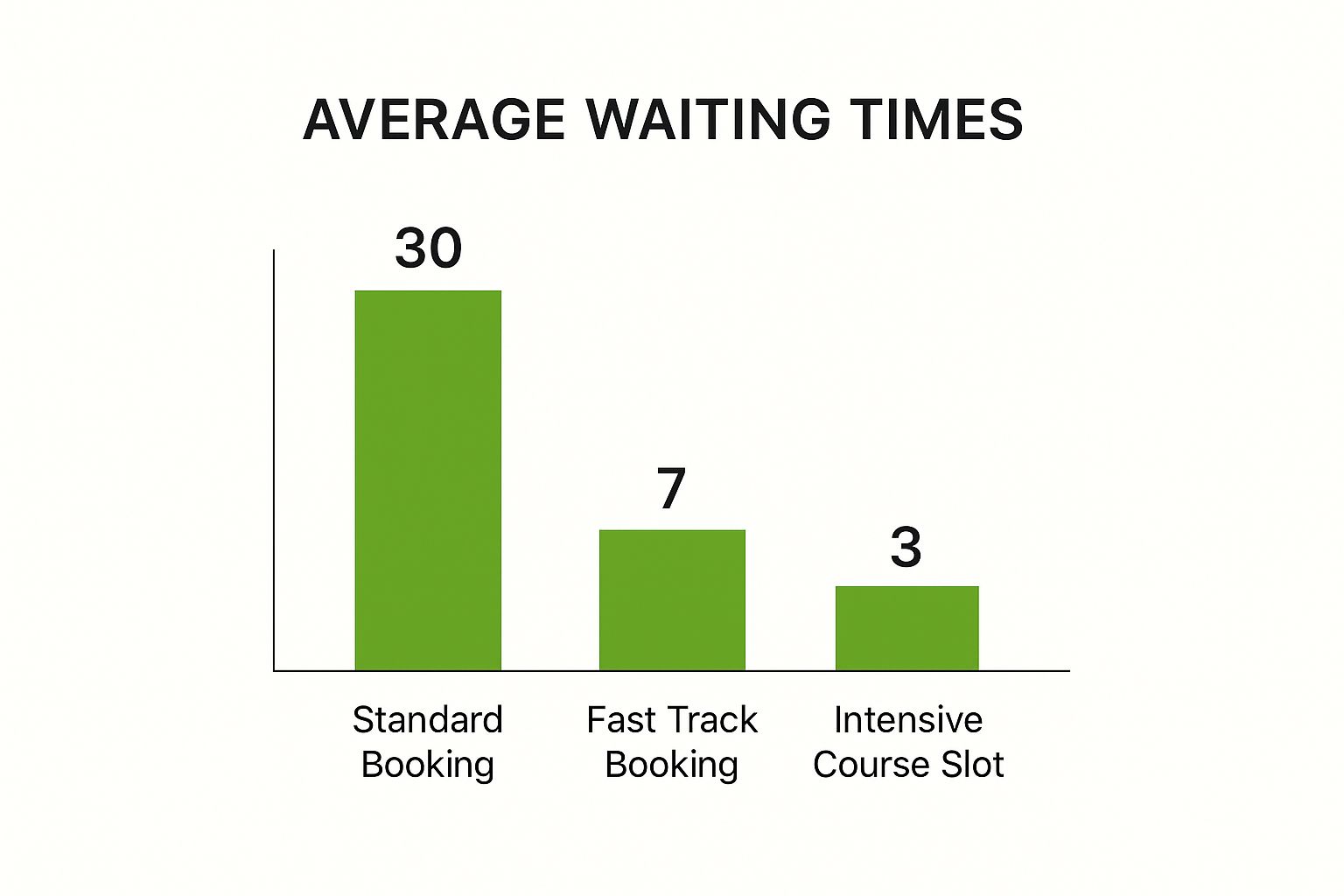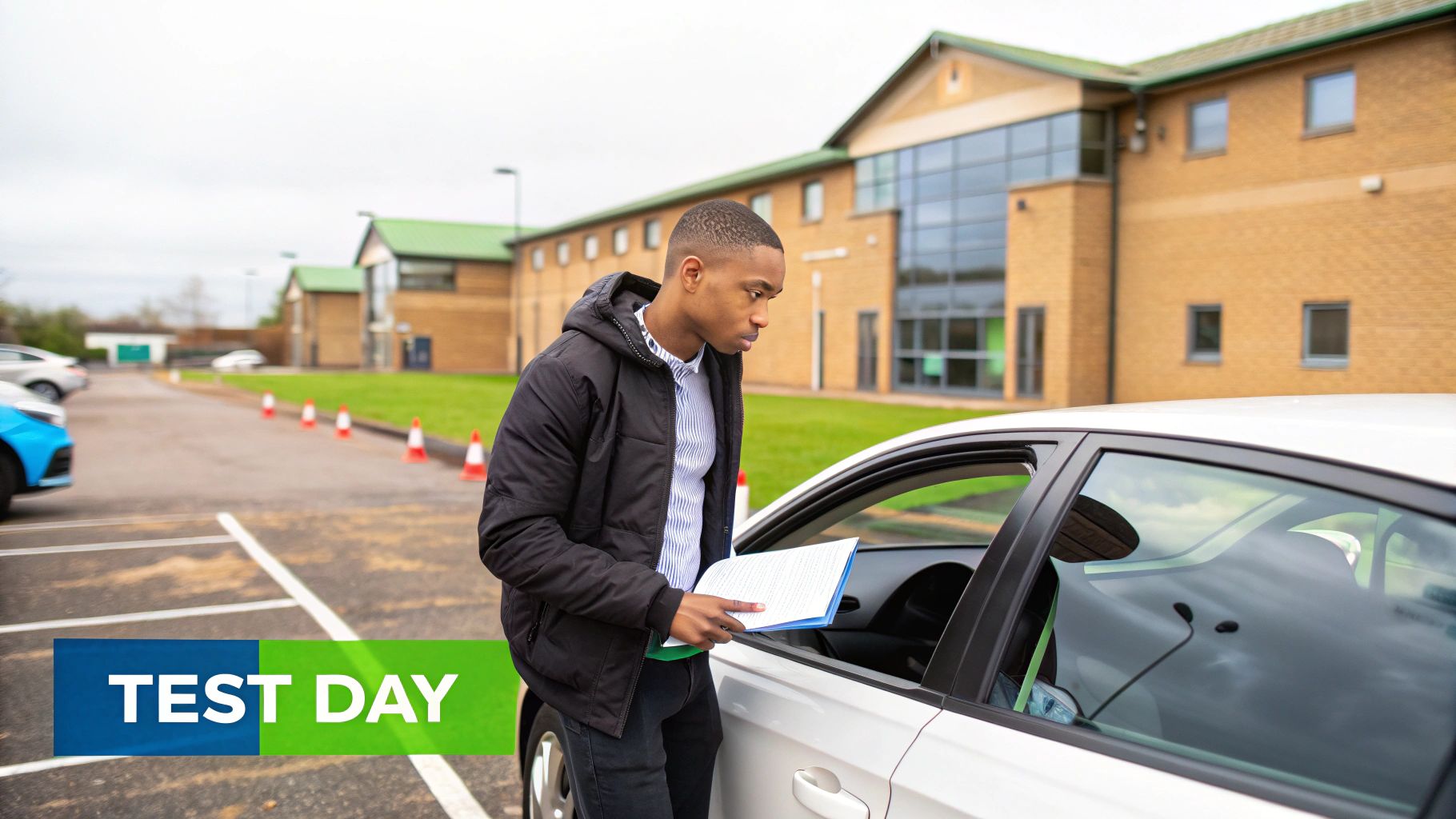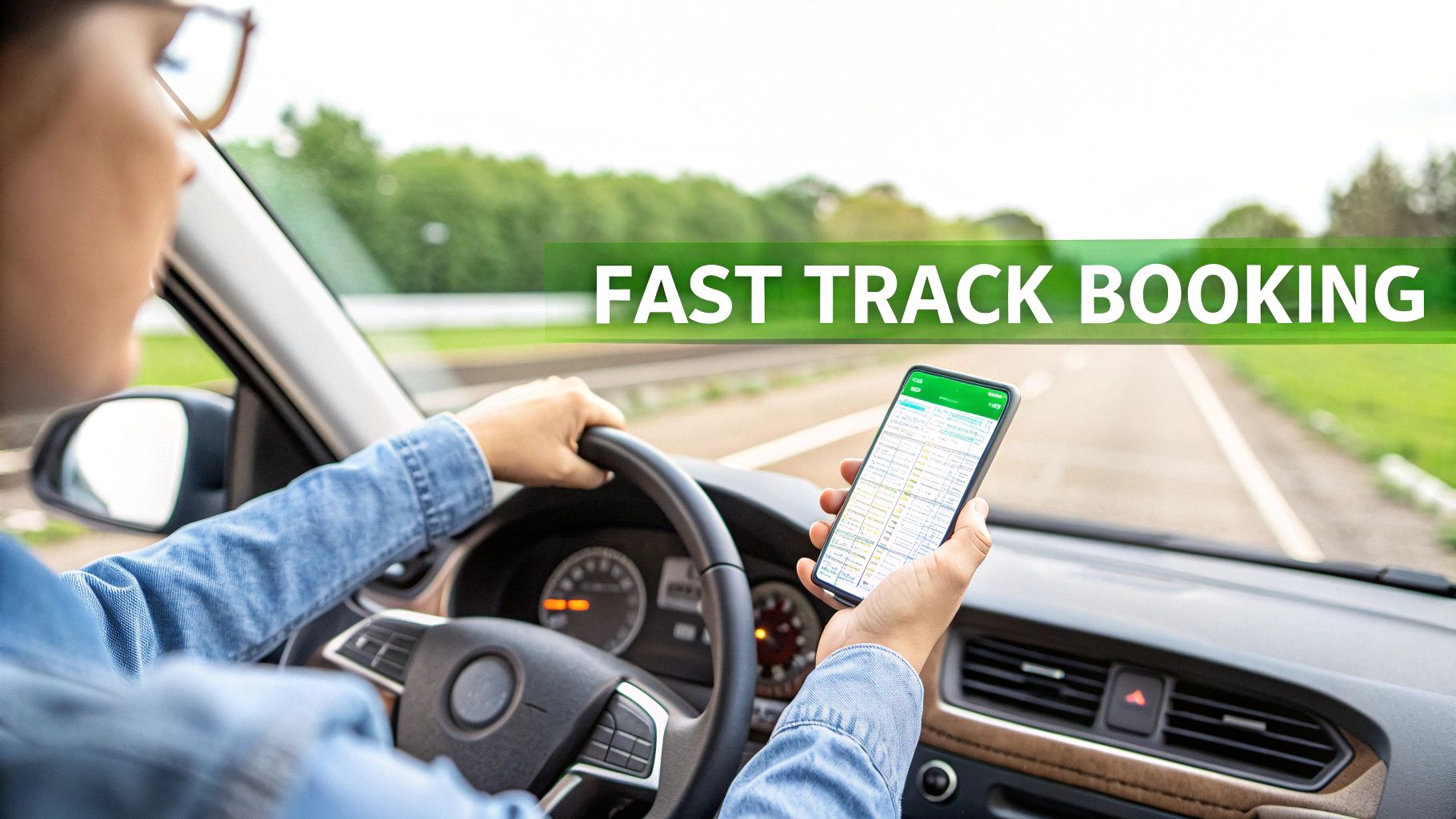The Reality of Driving Test Booking Today
Let's be frank: trying to find a driving test slot right now can feel like battling for tickets to see your favourite band. The demand is incredibly high, and the supply just isn't keeping pace. Understanding why this is happening is your first move towards beating the queue and making a fast track driving test booking a real possibility, not just a distant hope. The system is under huge pressure, a hangover from the pandemic backlog mixed with a continuing shortage of examiners.
This has created a situation where waiting times swing wildly depending on where you are in the UK. It’s a genuine postcode lottery. In late 2024, government data showed the average wait for a practical car test was around 13 weeks in Wales, over 15 weeks in Scotland, and a staggering almost 21 weeks in England. These numbers clearly show a system stretched to its absolute limit. You can dive deeper into the official government briefing on driving test waiting times for more details.
Why Are Some Areas Worse Than Others?
So, why might your friend in a nearby town get a test in eight weeks while you’re staring at a six-month wait? It comes down to a few key factors. Densely populated urban areas naturally have more learners all competing for the same limited slots. The popularity of a test centre, often down to rumours about "easier" routes or higher pass rates, can also create a serious bottleneck.
On top of that, the number of available driving examiners isn't consistent across the country. Some regions have a tougher time with recruitment and keeping staff, which directly affects how many tests they can conduct each day. This regional difference is a critical piece of the puzzle. For a bit more background, you can read about the historical context of these driving test waiting times to get the full story.
To give you a clearer idea of what to expect, the table below breaks down the general situation across different regions. This will help you spot where the biggest hurdles—and potential opportunities—are.
Regional Driving Test Waiting Times Comparison
A breakdown of current waiting times across different UK regions to help you identify the best booking opportunities
| Region | Average Wait Time | Test Centres Available | Peak Demand Periods |
|---|---|---|---|
| London & South East | 20-24 Weeks | High | Year-round, especially summer |
| Midlands | 18-22 Weeks | Moderate | University holidays, summer |
| North of England | 16-20 Weeks | Moderate | Summer, school holidays |
| Scotland | 15-18 Weeks | Lower | Summer, major city centres |
| Wales | 13-16 Weeks | Lower | Rural areas have less demand |
This isn't just a case of bad luck; it's basic supply and demand. Knowing these regional patterns allows you to think more strategically. While the DVSA is actively working to hire more examiners and open up more test slots, the immediate situation for learners is a waiting game. However, armed with the right knowledge, you can absolutely turn this waiting game into a winning one.
Mastering the DVSA System Like a Pro
The DVSA booking system is your direct path to a driving licence, but it often feels more like a lottery than a queue. However, learning how to work the system is a skill that can turn frustration into success and shave months off your wait. It’s less about luck and more about strategy, timing, and persistence—a bit like knowing the best time to pop to the supermarket to avoid the queues. The secret to a successful fast track driving test booking is understanding the system's rhythm.
When you log in, you're not just competing with other learners; you're up against automated bots and driving instructors bulk-booking slots for their students. This is why tests can vanish in the blink of an eye. The biggest mistake learners make is checking at random times that are convenient for them. To get ahead, you need to think like an insider. The DVSA releases new batches of test slots on Monday mornings at 6 am. This is your golden opportunity, but you have to be ready with your details, as these slots are usually gone in minutes.
Navigating the Official Booking Portal
First, get comfortable with the official government portal. It’s a surprisingly simple process once you know what to expect.
Here's what the start of the booking journey looks like on the GOV.UK website.

This first screen is your gateway, and it clearly lists the information you'll need, like your provisional licence number and theory test pass details.
A great tip is to have this information copied and ready to paste. It can save you critical seconds. When you’re in the system during those peak times, speed is everything. Fumbling around to find a number can mean losing a slot to someone who was better prepared. It can feel high-pressure, but staying calm and focused makes all the difference.
Handling Booking Frustrations
It’s incredibly disheartening to see a perfect slot, click on it, and then get an error message saying it’s no longer available. This usually means someone confirmed their booking just seconds before you did. But don't give up! This is actually a good sign that slots are becoming available at your chosen test centre.
Instead of closing your browser in frustration, try refreshing the page a few times. Sometimes, a slot gets released back into the system if someone’s payment fails or their session times out. The real key here is persistence. One focused session of checking is far more effective than glancing at the site sporadically throughout the day. Treat it like a mission, and you’ll seriously boost your chances of nabbing that coveted test date.
Cancellation Hunting That Gets Results
This is where the real art of securing a fast-track driving test booking comes into play. Forget spending hours endlessly refreshing the page; successful cancellation hunting is about strategy and understanding a bit of human psychology. Just think about it for a moment: why do people cancel their driving tests? It could be anything from sudden illness, car trouble, or simply a last-minute case of nerves. These things happen all the time, creating golden opportunities if you know when and where to look.
The secret isn't just about being constantly logged in, but about timing your searches intelligently. Most people will cancel their test with just enough notice to avoid losing their booking fee, which is three clear working days before the test date. This simple fact is your first major clue to smarter searching. For instance, if you're hoping for a Friday test slot, you should be actively searching on the preceding Monday. Likewise, cancellations for a Monday test often appear on the Wednesday or Thursday before.
Understanding the Rhythm of Cancellations
While the official release of new test slots typically happens on Monday mornings, cancellations are a different beast altogether. They pop up unpredictably, but there are definite patterns. Many experienced driving instructors have noticed that available slots tend to appear in surges during certain times of the day.
- Early Mornings (6 am – 8 am): This is a prime time. People often wake up feeling unwell or have a last-minute work commitment, leading them to cancel first thing. It's a great window to check before the rest of the country logs on.
- Lunchtime (12 pm – 2 pm): A midday check can often be surprisingly fruitful. People use their lunch break to sort out their personal admin, and that includes cancelling appointments they can no longer make.
- Late Evenings (9 pm onwards): After a long day of reflection (or perhaps a wobbly final lesson), some learners decide they aren't quite ready and cancel their test for the coming days.
To help you pinpoint the best times to look, here’s a breakdown of when cancellations are most likely to appear throughout the week. This data can help you focus your efforts for the best results.
| Day of Week | Peak Cancellation Time | Likelihood Score | Best Strategy |
|---|---|---|---|
| Monday | 6:00 am – 8:00 am | ★★★★★ | Prime time for weekend rethinkers. Check before work for tests later in the week. |
| Tuesday | 9:00 pm – 11:00 pm | ★★★★☆ | Evening cancellations are common as people assess their readiness for upcoming tests. |
| Wednesday | 12:00 pm – 2:00 pm | ★★★☆☆ | Lunchtime admin window. A good time for a quick, focused search. |
| Thursday | 6:00 am – 8:00 am | ★★★★☆ | Another early morning hotspot for last-minute changes for Monday/Tuesday tests. |
| Friday | 1:00 pm – 3:00 pm | ★★☆☆☆ | Lower likelihood, but some slots appear as people finalise weekend plans. |
| Weekend | Varies | ★☆☆☆☆ | Cancellations are less frequent but can appear at any time. Worth checking if you have spare moments. |
This table shows that by focusing your searches on Monday mornings and weekday evenings, you significantly increase your chances. It’s about working smarter, not harder.

The data in the chart above clearly shows that a focused, fast-track approach that relies heavily on strategic cancellation hunting can slash your waiting time from several months down to just one week. This isn't about getting lucky; it's about being prepared to act when these predictable windows of opportunity open up. By targeting peak cancellation times, you stop wasting your energy and start making real progress towards getting your licence.
Smart Booking Strategies Beyond the Obvious
Sometimes, the usual tricks for a fast track driving test booking, like endlessly refreshing the cancellation page, just don't work when everyone else is doing the same thing. This is when a bit of creative thinking comes in handy, using legitimate strategies that savvy learners often turn to. For instance, have you ever thought about looking for a test outside your immediate local area? It might sound a bit intimidating to take a test in an unfamiliar town, but it can be a surprisingly effective way to cut down your wait time.

Broadening Your Search Radius
The truth is, test centres in quieter, more rural areas often have much shorter waiting lists than those in busy cities. A four-month wait in a major urban centre could easily be just six weeks in a town that's only an hour or two away by train. You just need to weigh up the pros and cons. Is a day trip and a couple of extra lessons to get used to the new roads worth getting your licence months earlier? For many learners, the answer is a definite yes.
Before you jump in and book, make sure you do a bit of homework:
- Check out the public transport links to the new test centre.
- Have a chat with your instructor about the idea; they might have taken other students there before or be willing to travel for a lesson.
- Look up YouTube videos of test routes in that specific area to get a feel for the layout and any tricky junctions.
Taking this kind of proactive approach is key. It's all about securing a specific time slot in a busy system. In a way, it's a bit like event management, where organisers create efficient RSVP links to manage bookings and confirm attendance for a specific time.
The Instructor Advantage
Don't forget, your driving instructor is your biggest asset in this process. They do more than just teach you clutch control; they have a wealth of experience with the booking system and often have access to a special portal for businesses. Be open with them about how quickly you want to pass. Many instructors partner with companies like ours that provide intensive driving courses, which usually include a pre-booked test slot. This can be the most straightforward path to a speedy test.
The long waiting times haven't gone unnoticed by industry bodies. Organisations like the Driving Instructors Association (DIA) have been lobbying for changes to the system. In response, the DVSA has begun to roll out new measures, such as stricter cancellation policies, to help free up slots for learners who are genuinely ready for their test. You can discover more insights on these industry discussions to understand how these changes might impact booking availability in the future.
The True Cost of Fast-Track Booking
Talking about money isn’t always the most exciting topic, but when it comes to a fast-track driving test booking, getting a clear view of the full financial picture is essential. The standard DVSA practical test fee of £62 is really just your starting point. The actual cost often balloons with other expenses that can easily catch you off guard if you aren't prepared.
Let's be honest: securing an earlier test usually means you have to be flexible. You might snap up a cancellation at a test centre 50 miles away. While this is great for slashing your waiting time, you need to account for the cost of getting there—whether that's fuel for your car or a last-minute train ticket. It also means you’ll likely need to pay your instructor for their travel time and the use of their car for a longer period than you initially planned.
Budgeting for the Unexpected
One of the biggest hidden costs is the need for extra lessons. If you suddenly land a test for next week, are you really ready? Many learners find they need a few intense top-up lessons to get their skills razor-sharp and build confidence, especially if the test is in an unfamiliar area. This can easily add £100-£200 to your budget out of nowhere.
Think of it as your "pass mission" fund. A smart move is to create a small contingency pot. Having an extra £150 set aside can cover those last-minute lessons or travel costs without adding financial stress. It also acts as a safety net if things don't go to plan and you find yourself needing to rebook.
For example, a learner named Dan from London was looking at a six-month wait. He paid a third-party service £170 for a faster test slot. His reasoning? It was cheaper than paying for months of pointless "maintenance" lessons, which he estimated would have cost him over £1,000. While we don't recommend unofficial routes due to potential data privacy risks, his calculation shows the kind of financial trade-off many people consider. He weighed the higher upfront cost against the slow drain of weekly lessons and decided the fast-track option was more economical in the long run. This is exactly the kind of personal cost-benefit analysis you need to do to figure out what’s right for your own situation.
Staying Ahead of Common Booking Disasters
Even with the best plan, the road to securing a fast track driving test booking can have a few bumps. Knowing how to handle these common issues is often what makes the difference between getting a test date and being stuck endlessly refreshing the page. From tech hiccups to simple human mistakes, being prepared for what might go wrong helps you stay in the driver's seat.

Navigating Technical Glitches and Human Error
Picture this: you've finally spotted the perfect test slot. You're rushing to book, you enter your payment details, and then… the page crashes. It's a truly gut-wrenching moment. The most common technical problems include website timeouts, payment gateway failures, or the slot vanishing just nanoseconds before you can confirm it. Your best defence is being ready. Before you even begin searching, have your provisional licence number, theory pass certificate number, and payment card details ready to copy and paste. Using a browser with auto-fill enabled can also save you those crucial seconds.
Another frequent problem is getting the cancellation policy wrong. The DVSA requires three clear working days' notice to change or cancel your test without losing your fee. This doesn't count the day you cancel or the day of your test, and it excludes weekends and bank holidays. Forgetting this can be an expensive mistake, forcing you to pay the fee all over again.
Maintaining Your Skills and Motivation
One of the biggest booking disasters has nothing to do with technology—it's all about mindset. It can feel like a huge win to finally book a test, but if it's weeks or even months away, that long wait can lead to your skills getting rusty and your confidence taking a hit. The solution is to keep your driving skills sharp. Don't stop your lessons completely. Instead, you could switch to a fortnightly session just to practise manoeuvres and keep your road sense fresh. This ensures you're still ready to go when the date arrives, avoiding the panic (and expense) of last-minute cramming sessions. You can learn more about the common pitfalls people face by reading our guide on reasons for driving test failure.
The continued high demand for tests means this waiting period is a common experience for many learners. For example, forward bookings shot up by 12.3% between January and March 2025, which shows the pressure isn't letting up. On the bright side, the national pass rate has also improved to 48.9%, suggesting that learners who stay prepared are performing better on the day. You can discover more about these pass rate trends on RAC.co.uk. Actively managing the wait is a key part of your strategy.
Your Personal Fast Track Action Plan
Right, let’s turn all this theory into action. Knowing the tips is one thing, but success really comes from having a clear, personalised plan for your fast track driving test booking. This isn’t about being glued to your screen 24/7; it’s about creating a smart, manageable routine that boosts your chances without leading to burnout. Let's build your roadmap to getting that test slot booked.
Setting Up for Success
First things first, let’s get your digital ducks in a row. A simple but effective trick is to create a note on your phone or computer with your provisional licence number and your theory test pass number. This means you can copy and paste the details in seconds when a slot pops up—a tiny advantage that can make all the difference. You should also decide on your primary and secondary test centres now. Being open to two or three locations can triple your opportunities.
Next, it’s time to define your "go time" windows. From what we've seen with cancellation patterns, you'll want to commit to checking during specific high-yield periods. For instance, a solid routine might look something like this:
- Daily: A quick 15-minute check between 6:00 am and 7:00 am.
- Weekly: A more dedicated 30-minute session on Monday mornings for the new slot releases.
- Ad-hoc: A swift check during your lunch break or in the evening around 9:00 pm.
This structured approach keeps you in the game without it completely taking over your day. It’s all about consistent, targeted effort rather than random, frantic searching.
Your Weekly Booking Checklist
To keep yourself on track, think of it as a weekly mission. Your goal isn't just to book any test, but the right test that fits your schedule and readiness.
- Monday: Be prepared for the 6 am slot release. Even if you don’t manage to grab one, it’s a great warm-up for the week ahead.
- Tuesday/Wednesday: Shift your focus to hunting for cancellations in the evening. This is prime time for people to cancel tests scheduled for mid-week.
- Thursday/Friday: Check in the morning for any last-minute weekend cancellations that might appear.
- Stay Flexible: If a suitable slot appears at your backup test centre, be ready to snatch it up. Remember the main goal: getting your licence sooner.
This isn’t just about passively finding a date; it’s a proactive strategy that puts you firmly in control. Instead of waiting for months, you’re actively creating opportunities for yourself. This is the core principle behind what we do at Fast Pass Driving Courses. We handle the stressful booking process for you, securing a fast-tracked test as part of your intensive course package. Ready to skip the queue and focus on your driving? Book your course with Fast Pass Driving Courses today and let us get you on the road faster.

